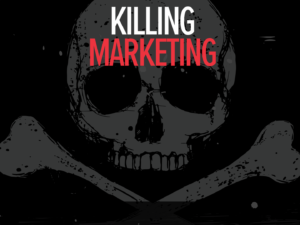About the Authors
 Killing Marketing Author Q & A with Joe Pulizzi & Robert Rose
Killing Marketing Author Q & A with Joe Pulizzi & Robert Rose
What is the “big idea” of the book?
The core principle of the book is that we’ve been misusing the marketing function for years. Marketing, in its truest form, was actually meant to be set up and function as a profit center.
– Joe PulizziThere are really two big ideas in this book. The first is how the business model of media companies and product companies are converging into one – which is as audience development platform. This means that using owned media to build an audience, and monetize that audience over time, is becoming a strategic imperative for both. That leads us to the second big idea which is that if these business models are converging, there is an opportunity to transform the activities that we call “marketing” today, into a profitable activity. Businesses have the opportunity to transform their marketing efforts into initiatives that realize cash value, better investments and higher return on everything they do. They can market at a profit. – Robert Rose
How will this book change the face of marketing?
The marketing department, as we know it, is dysfunctional. This book provides the roadmap for how marketers can drive 10 different revenue types directly from their marketing efforts. While Robert and I were doing our research for the book, we looked into both successful new media companies as well as enterprises who have seen benefits from a content marketing approach. What we found, to our pleasant surprise, is that the revenue model for both media companies and product brands is EXACTLY the same. Now, we may perceive the New York Times and Cisco Systems as completely different companies, but the content-first business models behind them are actually more alike than different. – Joe Pulizzi
Our hope is that this book squarely refocuses content marketing as a business strategy that marketers happen to perform. Content Marketing is utilized, for the most part, as a tactic to draw in more qualified leads into a sales funnel. Put more simply: it is seen as an alternative form of advertising. This is where most content marketing fails, because it is, inherently, a more expensive approach than simple advertising. Thus, if businesses only look at it as a replacement for advertising, they are missing the other, integrated, value that it can provide. Hopefully, this book illustrates the multiple lines of value that content can provide. -Robert Rose
What was the reason behind writing this book?
In 10 years, Robert Rose and I believe that this will be the model for the marketing department of tomorrow. 99% of marketers aren’t even thinking about this. What we are/were taught in school is now irrelevant. More people need to be looking at this now…to save our profession.
-Joe PulizziAfter consulting with hundreds of organizations and watching many of them begin to truly lead their marketing efforts with a content-centric approach, we saw the opportunity. Then, as we see media companies moving quickly to this model, it became clear that many product/service companies could do the same. Following this approach may be the biggest opportunity to shake up the marketing department since the Four p’s were invented 60 years ago. -Robert Rose
How is this book different from your past books?
Although there are how-to components, this is not a how-to…it’s more a Jerry Maguire mission statement for the marketing professional. Normally when creating a book, we start with the answer to a question. For example, in my 2013 book Epic Content Marketing, I talk about how marketers can build loyal and profitable relationships with customers by delivering consistently valuable content in order to drive sales. In 2015, Robert (with Carla Johnson) wrote the book Experiences: the 7th Era of Marketing, which outlines an approach on how content-driven experiences can be created, managed, scaled, promoted, and measured in today’s business environment. This book, however, does not start with an answer…it begins with one important question: “What if everything we KNOW to be true about marketing is actually what’s holding back our business?” – Joe Pulizzi
This is not a practitioner handbook. While we do cover taking some of the first steps, this book is more of a thorough business case. We are making a case, through the use of examples and research of businesses that are making this kind of transition. -Robert Rose
One example you feature in the book, and what we should learn from it?
Arrow Electronics is one of the largest companies in the world, generating over $24 billion dollars (USD) in annual revenues. They are the world’s largest distributor of electronic components, from semiconductors to circuit boards, and now service over 100,000 customers around the globe. Research showed a critical issue for engineers was keeping their engineering knowledge up to date. After watching electronics publications that they advertise in, struggle for years, Arrow decided to become the trusted source for electronic engineers. They made the decision to become the media. They recently purchased 51 media properties and runs that side of marketing as a profit center. They drive revenue through web advertising on their content brands, sponsorships, print advertising and more. They even produce content, as a service, for some of their competitors. -Joe Pulizzi
One of my favorites is the Zappos Insights program. They have begun to monetize a set of both online training, and physical training for their approach to customer service. They are treating these training programs as product platforms in and of themselves. Of course, now, they are marketing efforts – looking to bolster the Zappos brand. But, they are making revenue and they are running them at a profit. One of the things that Christine (the Zappos manager in charge of the program) said is that this is but one things that is helping them to think like a “100 year company”. They are looking well beyond just selling shoes – and truly how they “deliver happiness”. -Robert Rose
Quote from Joe on who this book is for, and why –
Killing Marketing is the roadmap for how the marketing department was always supposed to function. 50 years ago we lost our way. It’s time to find our way back home. -Joe Pulizzi
Quote from Robert on who this book is for, and why –
This book is for the senior level marketer in an organization, or someone who wants to be. This book is for the change agent, or the CEO that is looking to transform their business. This book is for the aspirational. If you’re looking for a cookbook on how to do tactical content marketing, you should look somewhere else. This book is a business case on why we need to transform our entire practice of marketing into something much more strategic. -Robert Rose
Any topics or ideas which the industry may find controversial?
The whole book is controversial…calling to dismantle the marketing department they currently have. We present an entirely new business model for marketing; one that both leverages the disruptive forces facing marketing and advertising as it also fundamentally changes the purpose of marketing in the business. We need to kill our old marketing beliefs to discover a new model. We believe most marketers are blind to this new opportunity. -Joe Pulizzi
THE AUTHORS
 About Joe Pulizzi:
About Joe Pulizzi:
Joe Pulizzi is the founder of Content Marketing Institute, a UBM company, the leading education and training organization for content marketing, which includes the largest in-person content marketing event in the world, Content Marketing World. Joe is the winner of the 2014 John Caldwell Lifetime Achievement Award from the Content Council. Joe’s the author of five books, including his latest, Killing Marketing coming September 2017. His third book, Epic Content Marketing was named one of “Five Must Read Business Books of 2013” by Fortune Magazine. You can find Joe on Twitter @JoePulizzi. If you ever see Joe in person, he’ll be wearing orange. www.joepulizzi.com
 About Robert Rose:
About Robert Rose:
Robert is the founder and Chief Strategy Officer of The Content Advisory – the consulting and advisory group of The Content Marketing Institute. As a strategist, Robert has worked with more than 500 companies including global brands such as Capital One, Dell, Ernst & Young, Hewlett Packard, and The Bill & Melinda Gates Foundation. Robert is the author of three books. His last, Experiences: The 7th Era of Marketing, was called a “treatise, and a call to arms for marketers to lead business innovation in the 21st century.” You can hear Robert on his weekly podcast with co-host Joe Pulizzi, “This Old Marketing”. He is also an early-stage investor and advisor to a number of technology startups, serving on the advisory boards of a number of companies, such as Akoonu, DivvyHQ and Tint. www.robertrose.net

